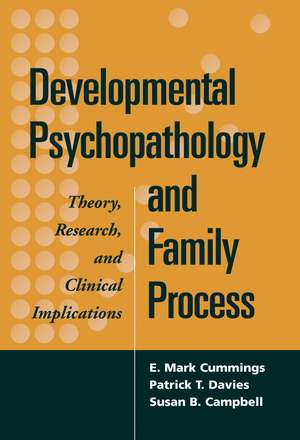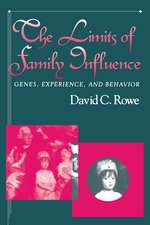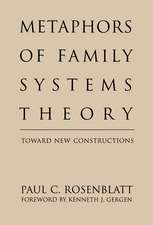Developmental Psychopathology and Family Process: Theory, Research, and Clinical Implications
Autor E. Mark Cummings, Patrick T. Davies, Susan B. Campbellen Limba Engleză Paperback – 11 apr 2002
Why do some children grow into resilient, adaptive adults, while others develop serious psychological problems? What are the dynamic processes and pathways that underlie normal and abnormal development? And how can the answers to these questions inform efforts to decrease both the prevalence and the severity of psychological distress? Focusing on the primary context in which children develop--the family--this volume unravels the complex connections among biological, psychological, and social-contextual processes that influence adaptation in childhood and adolescence. Explicating the basic concepts and methods of developmental psychopathology, the book sets forth a process-oriented framework for understanding human development and the onset of disordered behavior.
Preț: 381.71 lei
Preț vechi: 401.79 lei
-5% Nou
Puncte Express: 573
Preț estimativ în valută:
73.05€ • 76.17$ • 60.71£
73.05€ • 76.17$ • 60.71£
Carte tipărită la comandă
Livrare economică 21 martie-04 aprilie
Preluare comenzi: 021 569.72.76
Specificații
ISBN-13: 9781572307797
ISBN-10: 157230779X
Pagini: 493
Dimensiuni: 156 x 234 x 27 mm
Greutate: 0.72 kg
Ediția:New.
Editura: Guilford Publications
Colecția Guilford Press
ISBN-10: 157230779X
Pagini: 493
Dimensiuni: 156 x 234 x 27 mm
Greutate: 0.72 kg
Ediția:New.
Editura: Guilford Publications
Colecția Guilford Press
Public țintă
Professional and Professional Practice & DevelopmentCuprins
Introduction
I. Theory
1. What Is Developmental Psychopathology?
2. Identifying the Dynamic Processes Underlying the Development of Psychopathology
3. Methodological Directions in Developmental Psychopathology Research
4. Pathways in Development
5. Complex Patterns of Influence: Risk and Protective Factors
II. Research
6. Child Development and the Parent-Child Subsystem
7. New Directions in the Study of Parenting and Child Development
8. Children and the Marital Subsystem
9. Applications of Developmental Psychopathology: Parental Depression, Families, and Children's Development
III. Clinical Implications
10. A Developmental Psychopathology Perspective on the Diagnosis, Classification, and Conceptualization of Children's Problems
11. A Developmental Psychopathology Perspective on Prevention and Treatment
Epilogue
I. Theory
1. What Is Developmental Psychopathology?
2. Identifying the Dynamic Processes Underlying the Development of Psychopathology
3. Methodological Directions in Developmental Psychopathology Research
4. Pathways in Development
5. Complex Patterns of Influence: Risk and Protective Factors
II. Research
6. Child Development and the Parent-Child Subsystem
7. New Directions in the Study of Parenting and Child Development
8. Children and the Marital Subsystem
9. Applications of Developmental Psychopathology: Parental Depression, Families, and Children's Development
III. Clinical Implications
10. A Developmental Psychopathology Perspective on the Diagnosis, Classification, and Conceptualization of Children's Problems
11. A Developmental Psychopathology Perspective on Prevention and Treatment
Epilogue
Notă biografică
E. Mark Cummings, Ph.D., is Professor of Psychology at West Virginia University. His numerous publications focus on the functioning of children in the family, and the significance of the family for children's adjustment and development. He is particularly concerned with the importance of emotional relationships and expressions. His work has been featured on 20/20, USA Today, CNN, and in the Washington Post and Parent's Magazine, among other media.
Recenzii
A remarkable achievement. I know of few books in the psychopathology field that do such a good job of integrating current theory with up-to-the-minute, state-of-the-art research, and none that does such a good job with a family systems approach. Exceptionally well written, the book breaks new ground in creating new and complex dynamic models of the mechanisms linking risks and outcomes. Many new studies are incorporated that I had not yet come across. All of my graduate students will have to read this book, and I will be using it frequently as a reference text.--Philip A. Cowan, PhD, Director, Institute of Human Development, University of California, Berkeley
This book provides a rich analysis of extant theory and research on family influences and child development, including both psychopathology and resilience. The reader is helped to navigate a theoretically rich framework, challenged to grapple with difficult issues related to methodology, and provided with the 'state-of-the-art' knowledge derived from empirical research. The incorporation of a section on the clinical implications of this body of work serves to realize the full potential inherent in a developmental psychopathology perspective.--from the Foreword by Dante Cicchetti, PhD, Mt. Hope Family Center, University of Rochester
This superb volume is the best integration of material on the topic of developmental psychopathology that I have seen. It is a highly valuable introduction to the perspective and will be widely used and cited by students, scholars, and practitioners. New and exciting issues are highlighted throughout. In particular, the chapter on research methodology should be required reading for all graduate students in developmental psychology as well as clinical psychology.--Ross D. Parke, PhD, University of California, Riverside, Presidential Chair and Distinguished Professor in Psychology and Director, Center for Family Studies.
-This book provides a rich analysis of extant theory and research on family influences and child development, including both psychopathology and resilience. The reader is helped to navigate a theoretically rich framework, challenged to grapple with difficult issues related to methodology, and provided with the 'state-of-the-art' knowledge derived from empirical research. The incorporation of a section on the clinical implications of this body of work serves to realize the full potential inherent in a developmental psychopathology perspective.--from the Foreword by Dante Cicchetti, PhD, Mt. Hope Family Center, University of Rochester
This superb volume is the best integration of material on the topic of developmental psychopathology that I have seen. It is a highly valuable introduction to the perspective and will be widely used and cited by students, scholars, and practitioners. New and exciting issues are highlighted throughout. In particular, the chapter on research methodology should be required reading for all graduate students in developmental psychology as well as clinical psychology.--Ross D. Parke, PhD, University of California, Riverside, Presidential Chair and Distinguished Professor in Psychology and Director, Center for Family Studies.
Descriere
Why do some children grow into resilient, adaptive adults, while others develop serious psychological problems? What are the dynamic processes and pathways that underlie normal and abnormal development? And how can the answers to these questions inform efforts to decrease both the prevalence and the severity of psychological distress? Focusing on the primary context in which children develop--the family--this volume unravels the complex connections among biological, psychological, and social-contextual processes that influence adaptation in childhood and adolescence. Explicating the basic concepts and methods of developmental psychopathology, the book sets forth a process-oriented framework for understanding human development and the onset of disordered behavior.

















